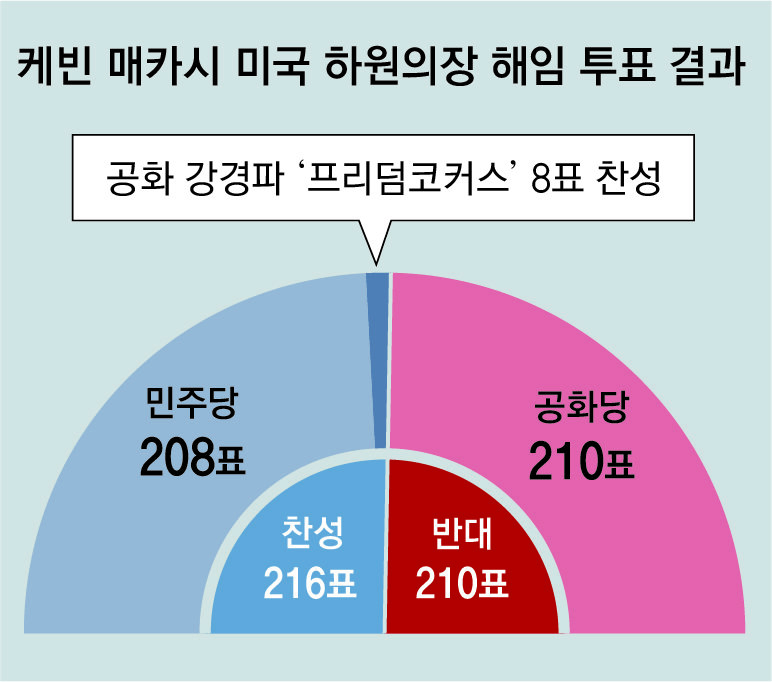[美하원의장 사상 첫 해임]
Speaker of the House dismissed for the first time in the 234-year history of Congress
“I hereby declare that the position of Speaker of the United States House of Representatives is vacant.”
On the 3rd (local time), silence descended on the Washington Capitol as the resolution to dismiss U.S. House of Representatives Speaker Kevin McCarthy was passed. A member of the opposition Republican Party shouted at the hardliners of the Republican Party who led the dismissal of Chairman McCarthy, a member of the same party, “Now what?”
The unprecedented dismissal of the Speaker of the House of Representatives, which occurred immediately after the crisis of the federal government shutdown (temporary business suspension) was temporarily resolved, plunged the U.S. political world into chaos with no way to know what was ahead. There are concerns that the political chaos will be prolonged as vetocracy (politics for opposition) is rampant in the U.S. Congress, which has prided itself on being the center of modern democracy based on dialogue and compromise.

Vetocracy, a compound word of ‘veto’ and ‘cracy’, refers to extreme partisan politics that unconditionally rejects the other party’s policies and claims. It became widely known after being used by Stanford University professor Francis Fukuyama, who lamented the shutdown of the U.S. federal government in 2013 due to the conflict between the Democratic Party and the Republican Party over the introduction of Obamacare.
The dismissal on this day began with an internal dispute in the Republican Party over next year’s budget. Faced with the threat of a federal government shutdown, Chairman McCarthy recently reached an agreement with the Joe Biden administration and passed a 45-day temporary budget. Then, the Freedom Caucus, a group of hard-line Republican lawmakers who value fiscal deficit reduction, strongly protested. Representative Matt Gates, a member of the Freedom Caucus, submitted a bill to dismiss the Speaker of the House on the 2nd, and in a vote held in one day, it broke expectations and passed.
The Freedom Caucus, established in 2015, has about 45 members. Of these, only eight supported Chairman McCarthy’s dismissal. However, the reason why the dismissal took place is because the House of Representatives has 221 seats for the Republican Party and 212 seats for the Democratic Party, with a difference of less than 10 seats between the two parties. Since it is a narrow majority party, this means that if even some of the party’s lawmakers leave, something completely different from the mainstream will could happen. On this day, ahead of next year’s presidential election, all members of the ruling Democratic Party voted in favor of the party line, expressing their disapproval of Chairman McCarthy, who ordered an impeachment investigation into President Biden, and anticipating internal corruption in the Republican Party. Eight hardliners in the Republican Party agreed, and the dismissal bill was passed. done.
The Freedom Caucus has been criticized for using bitocracy as a weapon to paralyze Congress. Former House Speaker Paul Ryan, McCarthy’s predecessor, retired from politics in 2019 after a power struggle with the Freedom Caucus. When Chairman McCarthy was elected chairman in January of this year, he barely became chairman after 15 votes due to opposition from the Freedom Caucus, and was kicked out nine months later. Chairman McCarthy immediately resigned from his position as chairman, saying, “I do not regret trying to find a solution through negotiations.” He criticized the Freedom Caucus, saying, “It opposes everything.”
A leadership vacuum has become inevitable in the U.S. House of Representatives for the time being. Republican Patrick McHenry, chairman of the House Financial Services Committee, was appointed interim chairman, but his authority is limited to adjournments and the confirmation of a new chairman, effectively halting all regular business in the House. The White House issued an emergency statement that day, saying, “The urgent tasks facing the United States cannot wait. “I hope to quickly elect a chairman,” he said.
However, there are observations that it will be difficult for any Republican Party member to step forward in a political environment dominated by hardliners. Representative Gates said, “I support Representative Steve Scalise as the next Speaker,” but he is suffering from blood cancer. Min Jeong-hoon, a professor at the National Diplomatic Academy, said, “If we cater to the tastes of hard-line lawmakers, we will be out of sync with mainstream Republican lawmakers,” and added, “It is highly likely that significant difficulties will continue in electing the next Speaker of the House.”
Accordingly, there are concerns that the federal government’s shutdown crisis may escalate again as the passage of key bills such as next year’s budget as well as the National Defense Authorization Act (NDAA) is delayed.
Washington =
Source: Donga
Mark Jones is a world traveler and journalist for News Rebeat. With a curious mind and a love of adventure, Mark brings a unique perspective to the latest global events and provides in-depth and thought-provoking coverage of the world at large.